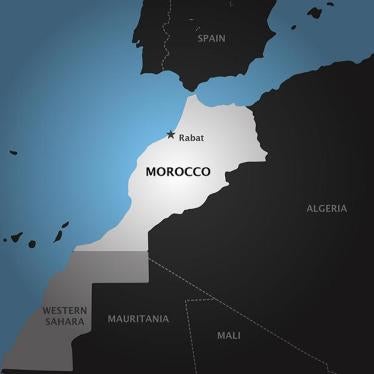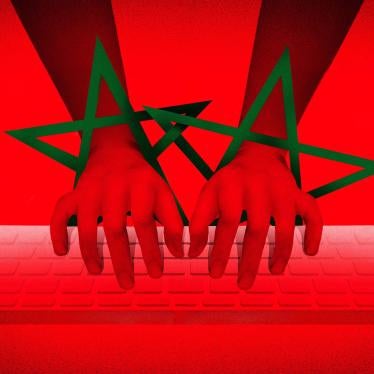(New York) – Moroccan authorities are using indirect and underhanded tactics to silence critical activists and journalists, Human Rights Watch said in a report published today. The moves aim to preserve Morocco’s coveted image as a “moderate,” rights-respecting country while it grows ever-more repressive.
In the 129-page report, “They’ll Get You No Matter What: Morocco’s Playbook to Crush Dissent,” Human Rights Watch documents a range of tactics that, when used together, form an ecosystem of repression, aiming not only to muzzle dissenting voices but to scare off all potential critics. The tactics include unfair trials and long prison terms for nonspeech criminal charges, harassment and smear campaigns in state-aligned media, and targeting dissidents’ relatives. Critics of the state were also subjected to video and digital surveillance, and in some cases to physical intimidation and assault that the police failed to investigate properly.
“Authorities use a playbook of underhanded tactics to repress dissenters while striving to keep intact Morocco’s image as a rights-respecting country,” said Lama Fakih, Middle East and North Africa director at Human Rights Watch. “The international community should open its eyes, see the repression for what it is, and demand that it stops.”
Human Rights Watch documented 8 cases of multifaceted repression, involving 12 trials and multiple associated targets. For that, it interviewed 89 people inside and outside of Morocco, including people subjected to police or judicial harassment, their family members and close friends, human rights defenders, social and political activists, lawyers, journalists, and trial witnesses. Human Rights Watch also attended 19 trial sessions of various dissidents in Casablanca and Rabat, reviewed hundreds of pages of judicial case files and other official documents, and closely monitored state-aligned media for over two years.
Since King Mohammed VI ascended to the throne of Morocco in 1999, Human Rights Watch has documented dozens of convictions of journalists and activists on speech-related charges, in violation of their right to freedom of expression. Such trials continue. Alongside them, authorities have refined a different approach for prominent critics, prosecuting them for nonspeech crimes, such as money laundering, espionage, rape and sexual assault, and even human trafficking.
Such serious criminal allegations should be investigated without discrimination, and those responsible should be brought to justice in trials that respect due process and are fair for all parties, Human Rights Watch said. The report assesses whether the trial process in such cases respected international standards governing the right to fair proceedings.
In the trials examined, Human Rights Watch found that dissidents, their relatives, or their associates were convicted based either on charges that by their very nature violated internationally recognized human rights or, when the charges were legitimate, on unfair proceedings that violated numerous fair trial guarantees. Procedural problems included pretrial detention without individualized justification, denying defendants access to their case files for protracted periods, rejecting defense motions to hear and cross-examine materially relevant witnesses, and sentencing jailed defendants in their absence after police failed to take them to court.
In their aggressive pursuit of dissidents, including on serious charges, the authorities have violated the rights of their acquaintances, partners, families, and even people the authorities allege to be their victims.
In one case, a court convicted Afaf Bernani of “defaming the police,” after she accused them of forging a statement in which she appeared to affirm to being sexually assaulted by her former boss, Taoufik Bouachrine, editor of the last critical daily print newspaper in Morocco. Bernani strongly denied ever making such an accusation. Bouachrine was later sentenced to 15 years in prison in 2019 on multiple accounts of sexual assault; Bernani has fled into exile.
Investigations by Amnesty International and the Forbidden Stories journalistic consortium found that Moroccan authorities were behind the hacking of the smartphones of several journalists and rights defenders, alongside possibly thousands of other individuals, using the Pegasus spyware, between 2019 and 2021. Once it infects a smartphone, Pegasus grants government-linked parties unfettered access to all the device’s content.
One of the Pegasus targets whose case Human Rights Watch examined, economist and rights activist Fouad Abdelmoumni, was also subjected to video surveillance. After defying threats made by anonymous parties if he did not tone down criticism of the authorities, secretly filmed video clips showing him in intimate situations with his then-fiancée were sent to her family. In Morocco, nonmarital sex is a crime punished by imprisonment and a cause for social stigma, especially for women.
Whether or not they ended up in court or in prison, the people whose cases Human Rights Watch examined were all subjected to pervasive smear campaigns by a constellation of websites that a group of 110 Moroccan independent journalists refer to as “defamation media” and are alleged to have ties to Morocco’s police and intelligence services.
The websites often feature articles about critics of the state featuring insults and personal information including banking and property records, screenshots of private electronic conversations, allegations about sexual relationships or threats to expose them, along with intimate biographical details about the targets’ relatives, friends, and supporters.
Dissidents interviewed said that just the prospect of being targeted by such media deters them from speaking out. “There is a climate of inquisition,” said Hicham Mansouri, a journalist who obtained asylum in France after spending 10 months in prison in Morocco for adultery. “Sex, drugs, alcohol … if they can't find anything, they’ll fabricate accusations [against you].”
Other tactics documented include physical surveillance and targeting family members. Hajar Raissouni, a journalist convicted of having nonmarital sex with her fiancé and an illegal abortion, said the police interrogated her about two of her uncles who are renowned dissidents. Agents also provided details about her relationship with her then-fiancé, including the dates and hours she walked his dog and the dog’s name.
The tactics Human Rights Watch documented violate Morocco’s international human rights obligations, including the right to privacy, freedom of expression and association, and the right to due process and a fair trial for those accused of a crime.
“What at first appears to be regular instances of law enforcement and scattered acts of harassment and media smears, turns out, when you connect the dots, to be a full-fledged playbook to crush dissent,” Fakih said. “Morocco’s international partners should recognize it for what it is, and call out Morocco for it, loudly and clearly.”








